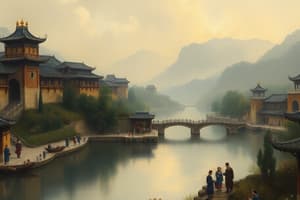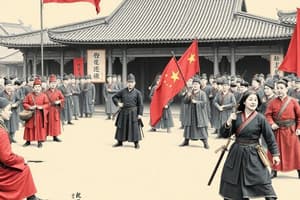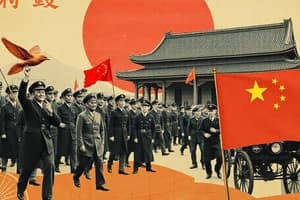Podcast
Questions and Answers
What factors contributed to the Chinese Revolution?
What factors contributed to the Chinese Revolution?
- Feudalism, capitalism, and imperialism
- Monarchy, democracy, and colonialism
- Religious conflict, social inequality, and environmental degradation
- Nationalism, Marxist ideology, and resistance against foreign powers (correct)
Which event marked the beginning of the decline of the Qing Dynasty?
Which event marked the beginning of the decline of the Qing Dynasty?
- Hundred Days' Reform
- May Fourth Movement
- First Opium War (correct)
- Great Leap Forward
Who initiated the Cultural Revolution in China?
Who initiated the Cultural Revolution in China?
- Chiang Kai-shek
- Sun Yat-sen
- Deng Xiaoping
- Mao Zedong (correct)
Which movement aimed at advocating for modernization and reform in China?
Which movement aimed at advocating for modernization and reform in China?
What was the main objective of Mao Zedong's Cultural Revolution?
What was the main objective of Mao Zedong's Cultural Revolution?
During which period did Mao Zedong create chaos and upheaval throughout Chinese society?
During which period did Mao Zedong create chaos and upheaval throughout Chinese society?
What major event marked the beginning of the end of the old order in China?
What major event marked the beginning of the end of the old order in China?
Who proposed the disastrous 'Great Leap Forward' economic program in China?
Who proposed the disastrous 'Great Leap Forward' economic program in China?
Where did the Nationalists retreat to after losing the mainland to the Communists?
Where did the Nationalists retreat to after losing the mainland to the Communists?
Which event led to the establishment of the People's Republic of China in Beijing?
Which event led to the establishment of the People's Republic of China in Beijing?
Which historical period saw the persecution of intellectuals, students, and Party members who opposed radical policies?
Which historical period saw the persecution of intellectuals, students, and Party members who opposed radical policies?
What was the main economic consequence of the Great Leap Forward in China?
What was the main economic consequence of the Great Leap Forward in China?
Flashcards are hidden until you start studying
Study Notes
Chinese Revolution
The Chinese Revolution is a term used to describe several periods of significant political upheaval and social change in China over the course of nearly a century. These events were driven by various factors such as nationalism, Marxist ideology, and resistance against foreign domination, particularly by Western imperial powers and Japan. Here, we will focus on five key events within this broader revolution: the Fall of the Qing Dynasty, the Cultural Revolution, the Great Leap Forward, the Chinese Civil War, and the May Fourth Movement.
Fall of the Qing Dynasty
The beginning of the Chinese Revolution can be traced back to the late 19th century when the Qing Dynasty was facing increasing internal turmoil and external pressure from Western countries and Japan. This dynasty had ruled China since 1644, but its decline began with the First Opium War (1839–1842), which highlighted China's vulnerability to European powers. Protests erupted during the Hundred Days' Reform in 1898, advocating for modernization and reform, which ultimately led to the collapse of the Qing Empire.
Cultural Revolution
Contrary to popular belief, Mao Zedong did not initiate the Chinese Revolution that ended in his reign; he started his own version under the name of the 'Cultural Revolution,' launched in 1966. Mao aimed to purge the party of pro-Soviet elements, and in doing so, created a period of chaos and upheaval throughout society. The ten years of the Cultural Revolution saw the persecution of intellectuals, students, and other Party members who opposed Mao's radical policies.
Great Leap Forward
From 1957 to 1961, following the successes of Soviet agriculture, Chairman Mao proposed a massive economic program called the 'Great Leap Forward.' The plan included collectivizing agriculture, constructing large-scale industrial projects, and rapidly expanding steel production. Despite initial enthusiasm, the Great Leap Forward proved disastrous, resulting in widespread famine due to mismanagement and poor decision-making.
Chinese Civil War
Following the end of World War II, the Nationalists and Communists fought for control of China, leading to a prolonged civil war that lasted from 1945 to 1949. The Nationalists, led by Chiang Kai-shek, retreated to Taiwan after losing the mainland to the Communist forces led by Mao Zedong. The communists established the People's Republic of China (PRC) in Beijing, while the remnants of the Nationalist government established the Republic of China (ROC) on Taiwan.
May Fourth Movement
The May Fourth Movement was a major turning point in modern Chinese history and played a crucial role in shaping China's future. It occurred in 1919 when student protests swept across China in response to the Treaty of Versailles, which handed German territories in Shandong Province to Japan rather than returning them to China. The movement marked the beginning of the end of the old order and laid the foundation for the New Culture Movement—an intellectual and cultural renaissance that paved the way for the eventual fall of the Qing Dynasty.
In conclusion, the Chinese Revolution spanned several decades and covered multiple events, culminating in the establishment of the PRC and the demise of the ROC in Taiwan. The revolution was characterized by shifting power dynamics, waves of nationalism, and attempts at modernization, all influenced by the complex interplay of domestic politics and international relations.
Studying That Suits You
Use AI to generate personalized quizzes and flashcards to suit your learning preferences.




